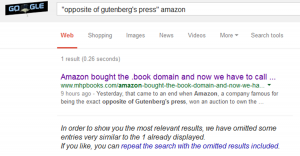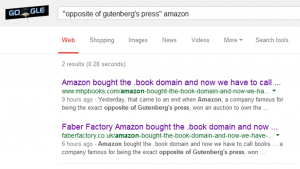The latest anti-Amazon tantrum over at Melville House has really taken spin and smug self-delusion to new heights:
The book had a pretty good run. After starting with a bang—the first book published, a debut novel by a ~6 billion year old author, was an instant bestseller—the book has been the dominant cultural medium for centuries… Yesterday, that came to an end when Amazon, a company famous for being the exact opposite of Gutenberg’s press, won an auction to own the .book domain name.
Let’s stop right there for a moment to ponder the magnificent bias required to declare that Amazon is “famous for being the exact opposite of Gutenberg’s press.”
Firstly, a quick Google search of the phrase “opposite of Gutenberg’s press” (I left the “exact” out to be generous) reveals a single return, the very Melville House rant in which this observation is declared “famous.”
I guess when you’re living in a neurotic echo chamber, one’s own opinion is adequate for a declaration of “famous.”
Secondly, how is a new way of pushing out books that greatly increases the speed and efficiency of publishing the “opposite” of Gutenberg’s press? Answer: it’s not.
Amazon, in particular its ebook production, is the closest analogy to Gutenberg’s press in the history of books. It’s so absurdly analogous to Gutenberg’s press that you’d have to be an idiot not to recognize it; declaring it the “exact opposite” leans into psychosis.
If the grumpy partisans at Melville House can’t see this, they don’t understand the history of books very well.
But, let’s let them stamp their feet some more:
[W]e can no longer call books “books” because Amazon has paid $10 million to take that word from us… Amazon bought .book and with it they ended the supremacy of the idea of the book. Neoliberalism reigns supreme. The corporation has superseded the artist. The book is dead. All that remains is .book.
Can someone stuff a pacifier in Melville House’s collective mouth already?
_
In case you were wondering what the “similar” results were that Google hinted at, the other result was a cut-and-paste of Melville House:


